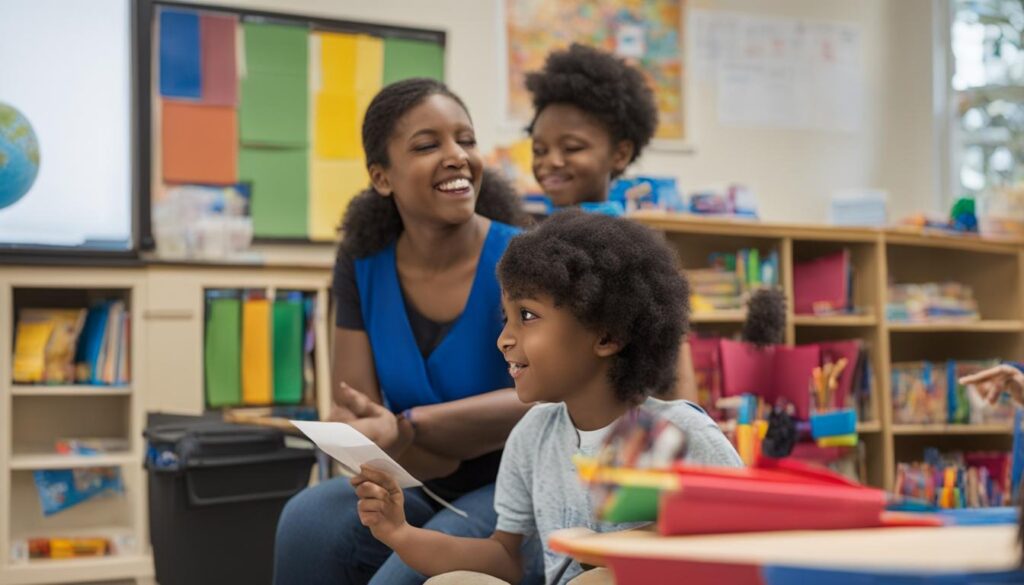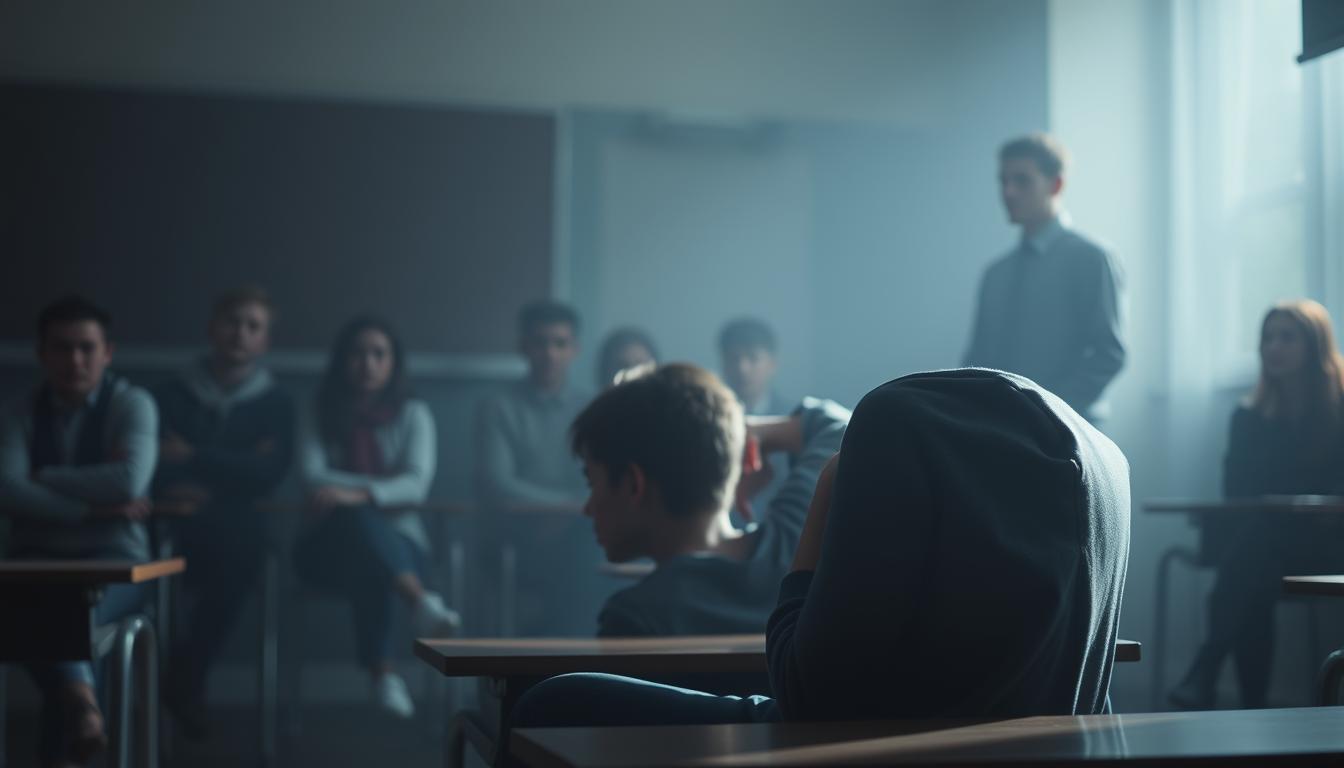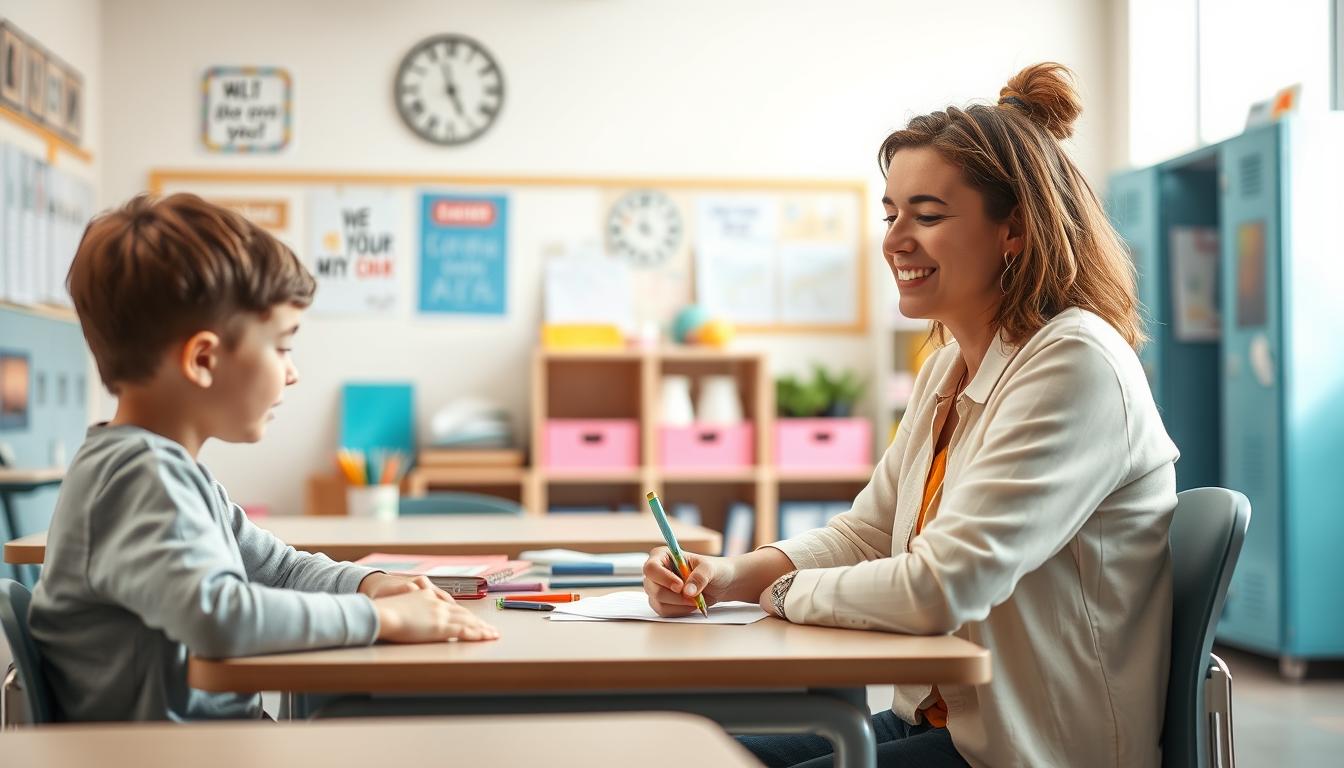Welcome to our comprehensive guide on building communication skills in a school setting. As school speech therapists, enhancing our students’ communication abilities is a crucial aspect of our role. Effective communication skills are not only vital for academic success but also essential for social interactions and future endeavors.
Throughout this guide, we will delve into various strategies and techniques that can be utilized by school speech therapists to enhance and improve students’ communication skills. These strategies are based on years of research and experience in the field, ensuring that you have the necessary tools to make a significant impact on your students’ lives.
By implementing these strategies, you will be able to create a supportive and inclusive environment where students can develop their communication skills to their fullest potential. Let’s dive in and explore the exciting possibilities of enhancing communication skills in our school settings.
Key Takeaways:
- Enhancing communication skills is crucial for academic success and social interactions.
- Effective strategies and techniques can be implemented by school speech therapists to improve students’ communication abilities.
- Creating a supportive and inclusive environment is essential for fostering communication development.
- Collaboration with teachers, parents, and other professionals can enhance the effectiveness of speech therapy.
- Empowering students with strong communication skills equips them with essential life skills for the future.
Strategies for Enhancing Communication Skills
Effective communication skills are essential for students to succeed academically and socially. School speech therapists play a vital role in helping students enhance their communication abilities. By implementing various strategies, speech therapists can create individualized therapy plans to address specific needs and foster students’ overall communication development.
The Importance of Individualized Therapy Plans
Every student has unique communication challenges, and a one-size-fits-all approach may not be effective. School speech therapists can tailor therapy plans to address individual needs and goals. By conducting comprehensive assessments, therapists can identify specific areas of improvement and design targeted interventions. This personalized approach allows students to progress at their own pace and achieve optimal outcomes.
Utilizing Assistive Technology
Assistive technology can greatly enhance students’ communication skills. Speech therapists can leverage a wide range of tools, such as speech-generating devices and communication apps, to support students with speech disorders or language difficulties. These technologies provide alternative means of communication and empower students to express themselves effectively.
Incorporating Language-Rich Activities and Exercises
Engaging students in language-rich activities and exercises can significantly boost their communication skills. Speech therapists can design interactive sessions that encourage vocabulary development, sentence construction, and conversation skills. Through games, role-playing, and storytelling, therapists create a stimulating learning environment where students can practice and refine their communication abilities.
Collaboration with Teachers, Parents, and Professionals
Collaboration is key to comprehensive communication skill development. School speech therapists should work closely with teachers, parents, and other professionals to ensure a holistic approach. By sharing insights and strategies, therapists can reinforce consistent communication support in the classroom and at home. This collaboration fosters a cohesive network of support and maximizes students’ progress.
By employing these strategies, school speech therapists can empower students to overcome communication challenges and reach their full potential. When tailored therapy, assistive technology, language-rich activities, and collaboration combine, students gain the necessary skills to succeed academically and socially.

| Strategies | Benefits |
|---|---|
| Individualized therapy plans | – Tailored approach to address specific needs – Personalized progress tracking – Targeted interventions for optimal outcomes |
| Assistive technology | – Alternative means of communication – Empowerment for students with speech or language difficulties – Enhanced expression and comprehension |
| Language-rich activities and exercises | – Vocabulary development – Sentence construction skills – Improved conversation abilities |
| Collaboration with teachers, parents, and professionals | – Holistic communication support – Consistent strategies across settings – Maximization of student progress |
The Role of Speech Therapy in School Settings
In school settings, speech therapy plays a vital role in improving students’ communication skills. Through evaluation, therapy techniques, and creating a supportive environment, school speech therapists enhance students’ ability to effectively communicate.
Evaluation process:
Determining communication difficulties is the first step in providing targeted therapy. School speech therapists use various assessment tools, interviews, and observations to identify speech disorders or delays.
Common speech disorders:
- Articulation disorders: difficulties in pronouncing sounds or words properly.
- Language disorders: challenges with understanding or using language effectively.
- Fluency disorders: disruptions in the flow of speech, such as stuttering.
- Voice disorders: abnormalities in pitch, loudness, or quality of the voice.
Range of therapy techniques:
- Speech sound intervention: addressing speech sound errors through targeted exercises and practice.
- Language therapy: developing vocabulary, grammar, and comprehension skills through interactive activities.
- Fluency strategies: assisting students in managing stuttering and improving speech fluency.
- Voice therapy: helping students improve vocal quality, resonance, and vocal hygiene.
Creating a supportive environment:
Establishing an inclusive atmosphere in schools is crucial for the progress of students in speech therapy. Collaboration between speech therapists, teachers, and parents ensures consistent support and reinforcement of communication skills. Providing resources, implementing accommodations, and promoting understanding among peers contribute to a positive environment for speech therapy.
By combining evaluation, therapy techniques, and a supportive environment, school speech therapists empower students to overcome communication challenges and thrive academically and socially.
Types of Speech Disorders
| Speech Disorder | Description |
|---|---|
| Articulation disorders | Difficulties in pronouncing sounds or words properly. |
| Language disorders | Challenges with understanding or using language effectively. |
| Fluency disorders | Disruptions in the flow of speech, such as stuttering. |
| Voice disorders | Abnormalities in pitch, loudness, or quality of the voice. |

Conclusion
In conclusion, this comprehensive guide has provided valuable insights and strategies for school speech therapists to enhance students’ communication skills. By incorporating the discussed strategies, utilizing individualized therapy plans, and fostering collaborative partnerships, school speech therapists can make a significant difference in the communication abilities of students.
Empowering students with strong communication skills not only improves their academic and social success but also equips them with essential life skills for the future. Effective communication is a fundamental aspect of daily life, and school speech therapists play a vital role in helping students overcome communication challenges and reach their full potential.
With the guidance and expertise of school speech therapists, students can develop clear and articulate speech, improve their language and vocabulary, and gain confidence in expressing themselves. These skills are not only beneficial during their school years but are also essential for succeeding in higher education, future careers, and building meaningful relationships.
FAQ
What is the importance of communication skills in a school setting?
Communication skills are essential in a school setting as they play a crucial role in academic success, social interactions, and overall personal development. Effective communication allows students to express their thoughts and ideas, understand and follow instructions, and collaborate with peers and teachers.
How can school speech therapists enhance students’ communication skills?
School speech therapists can enhance students’ communication skills by implementing various strategies and techniques. This may include individualized therapy plans tailored to the specific needs of each student, incorporating assistive technology to aid communication, and engaging students in language-rich activities and exercises to practice and improve their communication abilities.
What is the role of speech therapy in school settings?
In school settings, speech therapy plays a vital role in identifying and addressing communication difficulties among students. Speech therapists conduct evaluations to assess speech and language disorders, develop therapy plans, and provide interventions to improve students’ communication skills. They also collaborate with teachers, parents, and other professionals to create a comprehensive approach to communication skill development.
How can a supportive environment be created for students’ communication development?
Creating a supportive environment is crucial for students’ communication development. This can be achieved by fostering inclusive classrooms, promoting positive communication behaviors, providing opportunities for practice and feedback, and encouraging open dialogue among students, teachers, and therapists. Building a supportive environment ensures that students feel valued and motivated to improve their communication skills.
What are the benefits of collaboration between school speech therapists and other professionals?
Collaboration between school speech therapists and other professionals, such as teachers, occupational therapists, and psychologists, brings a multidisciplinary approach to supporting students’ communication skills. By working together, these professionals can share expertise, coordinate interventions, and provide holistic support to students, resulting in more comprehensive and effective communication skill development.
How can speech therapists contribute to students’ academic and social success?
Speech therapists play a significant role in students’ academic and social success by enhancing their communication skills. Improved communication abilities enable students to fully participate in classroom activities, effectively express their thoughts and ideas, engage in meaningful conversations with peers, and build positive relationships. Strong communication skills also boost students’ self-confidence and overall well-being.





